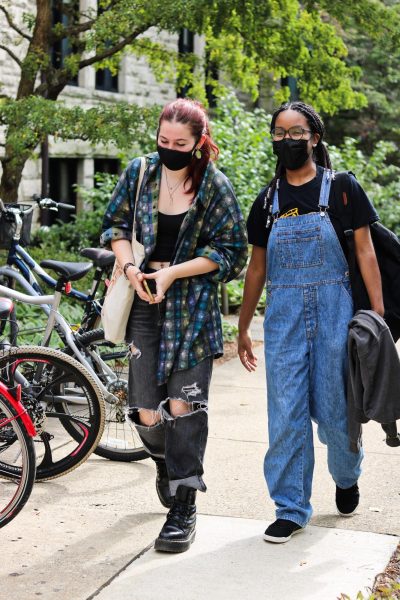College Doesn’t Value Student Feedback
I feel like a broken record when discussing mental health at Oberlin. But then again, each week, there are always new things that have gone wrong. While I believe that the school values feedback in some capacity, after two public forums were scheduled for inconvenient times last week, I’m no longer sure that is the case.
The first of these critical forums was an open event to discuss dining concerns on Oct. 21. I would not blame you for missing this event, since much of the advertising was very last-minute. Someone placed flyers around campus a day or two before it happened, and there was a single announcement in the Campus Digest, posted on the same day as the forum. Even if AVI Foodsystems had advertised earlier, the event was from 3–4 p.m. that day, when many students — myself included — had class. This behavior is the first in a string of similar actions that make me feel that AVI does not value feedback as much as it claims. Otherwise, why would it be so hard to give feedback in the first place?
I would have attended the Mental Health Coalition forum scheduled later the same day, but I had to work in the Writing Center instead. The panel happened from 7–9 p.m., and even putting my conflicts aside, it occurred at the same time as many Oberlin Workshop and Learning Sessions. As a former pre-med student, I can attest that STEM majors who attend these sessions frequently have to endure the most challenging courses and have the worst mental health on campus. Perhaps the College could not schedule these events at any other time, but regardless, the scheduling was highly inaccessible. Even though the pandemic has encouraged people to make in-person events remotely accessible, I did not see a Zoom link, audio recording, or transcript for either forum. This makes it even more difficult for students to provide feedback.
I also have criticisms of the existing mental health resources on campus. First, the wait times for therapy and psychiatrist appointments are horrendous. When I contacted the local CVS to re-fill my antidepressants, they told me to contact my psychiatrist in Oberlin for a refill. I called the Counseling Center on Oct. 19, soon after speaking with CVS, to set up therapy and psychiatrist appointments. They told me I could see a psychiatrist on Oct. 28 and my therapist on Nov. 2. On top of this, my psychiatrist said I only needed to email her about refills after my appointment. I did all of that work for nothing. Juggling this delay, classwork, writing articles, and play rehearsal gets exhausting. I’ve already had to miss work twice for mental health reasons over the past few weeks, and the pattern worsened until I finally got my medication back last week. It may be easier said than done to hire more people, but if the alternative is failing students like me, Oberlin needs to do more.
Food accessibility is also essential to mental health. The other day, I went to the Rathskeller before class and received a breakfast burrito with toppings different from what I ordered. With only 15 minutes before my class, I simply had to take a few bites and leave it at home while I went to class on an empty stomach. My partner experienced a similar mistake a few days ago. It’s challenging to have enough to eat when you don’t receive the food you ordered. At most times, DeCafé is nearly a food desert. Whenever I try to go, I usually leave with two Pop-Tarts and a drink — I may get a banana if I’m feeling spicy that day. I don’t want to overstate the obvious, but a lack of food can worsen mental health. This makes me irritable, unfocused, and even depressed on the worst days. AVI recently provided a survey for students to give feedback, but it includes a measly five questions that aren’t very in-depth. Student Senate has already recommended that students fill out a separate form to file grievances against AVI, which tells me enough.
I do see one effort on Oberlin’s part to improve mental health, but I’m still skeptical. When I checked the Campus Digest on Oct. 25, I saw a new application for students to become Mental Health Ambassadors. To no surprise, I was immediately disappointed. The position only pays $10 per hour, and it requires students to work four hours a week (with some weekends), attend meetings, organize monthly events, and possibly facilitate listening sessions. This pay is insulting for the importance of the job and its many listed and unlisted requirements. Beyond this, the position also requires a cover letter, résumé, and three references. I would hesitate to apply even if the pay were $12 per hour with half of the requirements. As a Black individual who has tried and failed to implement policies to improve mental health while on Student Senate, this position seems like a burden on Black people and POC. Improving campus mental health should not worsen the mental health of those already struggling.
When the College makes it difficult for students to provide feedback, it makes me feel that administrators do not care. One person can change the world, but only if given the proper support and resources. $10 an hour is not sufficient to support anyone, especially already marginalized groups who would take on that work. Minimal food availability does not give students the tools to study and succeed. Disorganization within vital resources like the Counseling Center is inconvenient and dangerous. It is disappointing that things are still this way after all this time, but I hope they can get better. I want Oberlin to change, but I’m not sure that the administrators with influence here want the same. I hope that the good people working at this school are not in the minority, but these trends do not give me faith.




